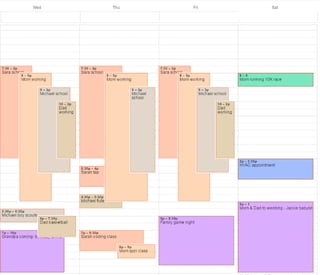- My sister is going to visit my parents this weekend; maybe I should plan to do the same.
- My dog has a vet appointment next week at the same time that my fiancé has a meeting; I guess I’ll be on my own with doggy duty.
- There’s a Red Sox home game at the same time as my field hockey game near Fenway on Monday; I’ll need to leave pretty early to get there.
Am I blessed with clairvoyance? Well, almost...allow me to explain exactly how my busy schedule became more manageable with the help of a little technology.
I know all of these scheduling details at the click of a button without asking a single soul, due to the  helpful sharing features of Google calendar. This gives me a clear picture of what I can expect over the coming weeks and allows me to adjust my plans based on the schedules of those around me. No endless ping-ponged emails and texts about who is doing what when - no “oops” moments when 2 events are scheduled for the same time. Pretty sweet, right?
helpful sharing features of Google calendar. This gives me a clear picture of what I can expect over the coming weeks and allows me to adjust my plans based on the schedules of those around me. No endless ping-ponged emails and texts about who is doing what when - no “oops” moments when 2 events are scheduled for the same time. Pretty sweet, right?
Connecting your personal Google calendar with family, friends, or organizations is one of the most useful tools for promoting independence in planning and prioritizing skills. As Executive Function coaches, we encourage use of this tool among family members to build these time management skills. It is also helpful to subscribe to calendars for sports teams or TV shows — anything that is important to keep in mind when planning your week.
So how does this awesome tool promote family harmony and build executive function skills?
When our students and their parents have a shared Google calendar, it eliminates the need for constant questions (“When do I have cello practice this week?”) and constant reminders (“Don’t forget you have Girl Scouts tomorrow!”). These endless questions and reminders can lead to tension, often marked by a frustrated “I know!” or an exasperated “How many times do I have to remind you?!” Allowing for transparency in the family and student’s schedules leaves less room for conflict and allows for fewer surprises. After all, the events on your radar as a parent (medical appointments or family events, for instance) are often not even remotely on a kid’s radar. How often has your child been surprised by a dentist appointment that seemed to pop up out of nowhere, even though you knew about it well in advance?
A shared calendar can shift the responsibility from the parent (“You never told me, Mom!”) to the child, which helps build accountability. When a parent asks “What does the family calendar have in store for us this week?” or “How will you plan your homework time this weekend, knowing that you have a sleepover Saturday night?” — that questioning process is helping to build executive function skills in a child. If, for instance, a student sees on the calendar that he has to go to his sister’s dance recital on Tuesday and then Grandpa is coming over for dinner and birthday cake on Wednesday, he can begin to understand why it may be a good idea to spend Sunday and Monday working on the Mesopotamian Civilization paper that is due Thursday.
Rather than telling a child what to do and when to do it, guiding him to come up with his own plan promotes those self-management skills that parents know are important for successful, independent living.
As our students enter adult life, having a shared Google calendar with colleagues, family, or partners will continue to allow for effective planning and prioritizing. If you see that your colleague is taking Thursday and Friday off, you might want to discuss next Monday’s presentation with her on Wednesday. Seeing that your spouse is running a race on Saturday morning will remind you that you may want to schedule that appointment with the HVAC guy for the afternoon instead. Having shared calendars will allow our students to lead fulfilling lives in harmony with those around them with fewer scheduling snafus and a clear picture of what to expect at work and at home. This skill stays with our students forever.
Does your child juggle a busy schedule with too many "really important" activities? Download our Priorities Matrix step-by-step guide below. This structured activity helps both kids and adults uncover their true interests and priorities — and provides a solid foundation for effective time management.

Maria Montague, M.S., CCC-SLP is a certified speech-language pathologist, reading specialist, and Executive Function coach with years of experience in public and private schools. Maria completed a master's program in both communication sciences and disorders and reading disabilities at MGH Institute of Health Professions and received an undergraduate degree from Northeastern University's School of Education. Maria's experience spans preschool to high school. Maria is a patient, understanding, and flexible coach with an arsenal of effective strategies and tools to help students better navigate their academic lives.

